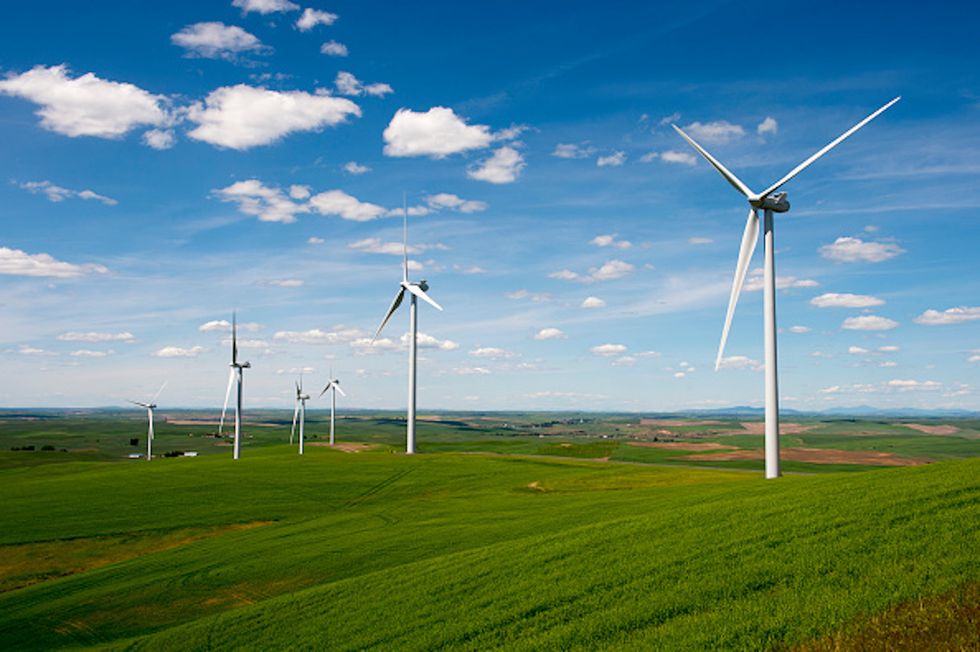
View of the Rosalia Wind Farm on the Palouse near Oaksdale, Washington. (Getty Images/Wolfgang Kaehler)

Republican lawmakers are laying the groundwork to make energy policy a key issue in the coming legislative sessions for the next Congress — and ultimately for President-elect Donald Trump.
The plan, according to multiple legislations introduced last month in the House and Senate, is to give states a turn at the regulatory control for energy development on public lands. Putting states in charge of the leasing, permitting and regulatory programs would prove to be a more efficient way to foster energy development, Republican lawmakers argue. But to get to the point where states are at the helm of energy development, Republicans have repeatedly offered multiple roadmaps — from giving Nevada ownership of the federal land within its borders to simply allowing for states to control the regulatory process on federal lands that would still remain the federal government’s.
With 23 cosponsors, Rep. Diane Black (R-Tenn.) said she is hopeful that under a Trump administration her legislation — which she has promoted multiple times — can become a reality.
The Federal Land Freedom Act would not change the ownership of federal public lands but would allow for states to have a say in the permitting process for energy exploration.
“We’re proposing this because, time and again, the federal government has proven itself to be too inept and too inefficient to do this on its own,” Black told TheBlaze.
While energy exploration has been an issue Black has raised in past legislative sessions, policy experts told TheBlaze that her bill lays the groundwork to make energy one of the major issues in the coming legislative session.
“This is an issue of national importance, and it demands the full attention of Congress, whether you represent an energy-rich state like Texas or a state like Tennessee,” Black said. “We all feel the effects of energy policies made in Washington every time we fuel up our cars or heat our homes for the winter and, similarly, we will all benefit when we start truly empowering states to regulate energy exploration on public lands within their borders.”
Opponents of Black’s bill argue that allowing states to control drilling and oil permits could be detrimental to the environment.
Randi Spivak, a public lands director for the Center for Biological Diversity, told Buzzfeed News last month that the bills are “bad legislation,” saying he was concerned about the “next congressional session under a new administration.”
“I certainly hope it’s not a sign of things to come one week after Republicans take control of the White House and maintain majorities in Congress that we have a hearing or two, and let me say, radical proposals that would completely reshape public land management for the benefit of private interest,” Rep. Alan Lowenthal (D-Calif.) said.
He also told Buzzfeed that Black’s bill, in particular, would open up “hundreds of millions of acres” for drilling permits.
But Matthew Anderson, a policy analyst for the Utah-based Sutherland Institute, argues that the federal government’s management of public lands has been dismal compared to what individual states could do.
“Raging wildfires, dying forests and inadequate law enforcement are but a few examples of the type of land management you get when bureaucrats stationed thousands of miles away are making all the decisions,” Anderson said. “To give states control of the oil and gas drilling permit process is to leave management decisions in the hands of those who know and care for the land the most.”
Aside from management, proponents of Black’s legislation argue that allowing states to control energy development within their borders would be profitable economically as well.
Anderson told TheBlaze that Black's bill would create a steady stream of revenue for local governments through energy development. In turn, it would make “our communities better educated and more prosperous.”
“Many Western communities are largely dependent on the royalty payments and taxes provided by resource extraction not only for their economy in general, but to fund vital government services like schools, roads, and police departments,” Anderson said.
Black also added that more energy developed at home — and not in the Middle East — would strengthen the U.S. as a country.
“The more energy we produce domestically, the stronger we will be as a nation,” she said. “But we will never achieve true energy security if the federal government bogs down the process in a regulatory maze.”
Black said she’s supportive of fellow Republican Rep. Mark Amodei’s own project — which would give federal land back to his state of Nevada — but said there is a stark difference between the two bills.
“Even if Democrats in Washington won’t get on board with transferring ownership of federal lands, they should at least be willing to meet us halfway and let states regulate energy production on these properties,” she said.
But despite opposition from those on the other side of the aisle, Black said she remains hopeful that the incoming Trump administration will be “receptive” to her legislation and looks forward to working with the president-elect directly on the issue of energy security.
“Throughout his campaign, President-elect Trump has been an advocate for protecting states’ 10th Amendment rights and decentralizing power in Washington,” she told TheBlaze. “There is no better way to do that than to give states full permitting authority for energy exploration on public lands.”
Trump’s campaign website boasts of a plan to “make America energy independent, create millions of new jobs and protect clean air and clean water” — albeit, the plan leaves out the “how” portion.
As the Washington Post reported, Trump has stacked his transition team for energy with experts who have ties to the oil industry, including Thomas Pyle of American Energy Alliance and Myron Ebell of Competitive Enterprise Institute.
A Trump spokeswoman did not respond to multiple requests for comment.